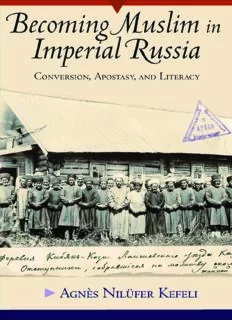
Becoming Muslim in Imperial Russia: Conversion, Apostasy, and Literacy PDF
Preview Becoming Muslim in Imperial Russia: Conversion, Apostasy, and Literacy
Becoming Muslim in Imperial Russia Becoming Muslim in Imperial Russia Conversion, Apostasy, and Literacy AGNÈS NILÜFER KEFELI Cornell University Press Ithaca and London Jacket illustration: Apostates standing in front of their underground mosque in Kibiak-Kozi, Laishevo district. RGIA, f. 821, op. 4, d. 72, photograph no. 9.No date. Photograph courtesy of RGIA. Copyright © 2014 by Cornell University All rights reserved. Except for brief quotations in a review, this book, or parts thereof, must not be reproduced in any form without permission in writing from the publisher. For information, address Cornell University Press, Sage House, 512 East State Street, Ithaca, New York 14850. First published 2014 by Cornell University Press Printed in the United States of America Library of Congress Cataloging-in-Publication Data Kefeli, Agnès Nilüfer, author. Becoming Muslim in Imperial Russia : conversion, apostasy, and literacy / Agnès Nilüfer Kefeli. pages cm Includes bibliographical references and index. ISBN 978-0-8014-5231-4 (cloth : alk. paper) 1. Islam—Russia—History. 2. Apostasy—Islam. 3. Apostasy—Christianity. I. Title. DK34.M8K44 2014 947.00882'97—dc23 2014006974 Cornell University Press strives to use environmentally responsible suppliers and materials to the fullest extent possible in the publishing of its books. Such materials include vegetable-based, low-VOC inks and acid-free papers that are recycled, totally chlorine-free, or partly composed of nonwood fi bers. For further information, visit our website at www.cornellpress.cornell.edu. Cloth printing 10 9 8 7 6 5 4 3 2 1 To Eugene Contents Acknowledgments ix List of Abbreviations xi Note on Transliteration xiii Maps xv Introduction . Apostasy, Conversion, and Literacy at Work . Popular Knowledge of Islam on the Volga Frontier . Tailors, Sufi s, and Abïstays: Agents of Change . Christian Martyrdom in Bolghar Land . Desacralization of Islamic Knowledge and National Martyrdom Conclusion and Epilogue Selected Bibliography Index Acknowledgments P erhaps because I grew up with both a Christian and a Muslim name and because I grappled from a very early age with diff erent possible identities imposed by French schools or inherited from my parents’ Celtic Breton and Turkic origins, I grew fond of the nineteenth-century Christian Tatar community whose names could also be either Christian or Muslim, depending on time, place, and context. Fortunately, no one asked me to choose between the diff erent layers of my personal identities, and I did not have to face the hardships that this community endured for their religious commitments. In my personal scholarly journey, I had the support of many who helped me enter the world of these villagers whose imagination, faith, and endurance inspire both my admiration and sympathy. I owe thanks to many people in the fi eld of Eurasian and Central Asian studies who have either provided sources and material support or commented on my work: Stephen Batalden, Wladimir Berelowitch, Daniel Brower, Devin DeWeese, Robert Ger- aci, Fred Giffi n, Shoshana Keller, Adeeb Khalid, Edward Lazzerini, Laurie Manchester, Danielle Ross, Daniel Schafer, and Paul Werth. My special gratitude goes to Allen Frank, whose passion for the Turkic literary world and sacred geography I share. I still recall our passionate conversations about Finno-Ugric and Turkic identities in Washington, DC, while I was a Kluge fellow at the Library of Congress. Finally, Uli Schamiloglu has always been my supporter and mentor since I came to the United States, giving me my fi rst lessons of Tatar language and Arabic script, and later providing me with the opportunity to teach Tatar. Th is research, however, would not have taken the shape it did without the strong support of my Tatar and Kräshen colleagues, scholars, archi- vists, and language teachers in St. Petersburg, Orenburg, and Kazan: Iakhia Abdul- lin, Marsel' Akhmetzianov, Goldzhihan Biktimirova, Damira Gobaidullina, Damir Iskhakov, Radik Iskhakov, Lialia Khasanshina, Gennadii Makarov, Nikolai Petrov, Madina Rakhimkulova, Endzhe Sagidova, Raushaniia Shafi gullina, Flera Urmanche, Farit Iakhin, Il'dus Zagidullin, and Fanzilia Zavgarova, who gave me access to local archives, extensive bibliographies, and the means and connections to do fi eldwork in the countryside. My colleagues Jim Allen (a Europeanist), Kay Carr (an Americanist), and Pori Park (a scholar of Buddhism) were especially supportive throughout project, and I deeply appreciate the breadth of their perspectives. My deepest gratitude and admiration go to the inhabitants of Elyshevo (Yïlïsh), in particular the journalist Golsina Khamidullina, who shared her home, pictures of her ancestral past, handwritten diaries and epics, and introduced me to her vil- lage’s sacred landscape and keeps me informed of its changes by e-mail. I was also
Description: